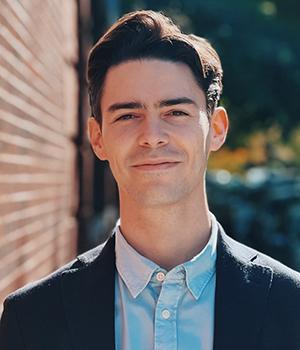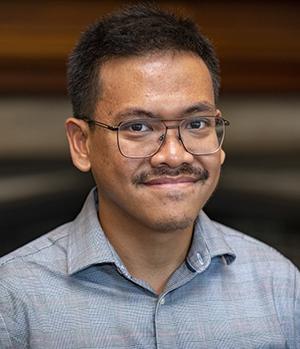A fund created to support the next generation of scholars
The Elmer Kennedy Memorial Fund invests in SSD Teaching Fellows
By Sarah Steimer
A son and his family’s remembrance of his father has created an investment in the Teaching Fellows Program in the Social Sciences. The inaugural recipients of the Elmer Kennedy Memorial Fund are Joshua Boone Trubowitz and Rafadi Hakim.
Elmer Kennedy graduated from the University of Chicago in 1919 with a degree in Social Sciences. He became an educator and taught in various high schools and junior colleges for 43 years until his retirement in 1962 at the age of 65. Among the high school classes Kennedy taught early in his career were English, Beginning Algebra, and Business Arithmetic. Later, he taught classes in Civics and American History and became a Social Sciences Instructor when he started teaching at the junior college level.
The benefactor of the fund, Wayne Kennedy, was Elmer Kennedy’s youngest son. Mark Fellows — Elmer’s grandson and Wayne’s nephew — is on the Wayne T. Kennedy and Lorelei F. Rockwell Family Foundation’s board of directors. Fellows explains that Wayne Kennedy and his wife, Lorelei Rockwell, began donating to various colleges and universities to honor their family members and business colleagues in 2008.
“Shortly after I started my college classes at the University of Cincinnati in the fall of 1975, my grandfather insisted that I take a Sociology course,” Fellows recalls. “I enrolled in two Sociology classes during my sophomore year and I did well in them. I enjoyed the topics and concepts taught in the classes, and I found that I could use what I learned from the classes later in life. The best part is that I got to talk to my grandfather about what I learned in my Sociology classes, and he really enjoyed the fact that I learned what he spent a career teaching. He passed away a couple of years later in December of 1979.”
A competitive two-year position open to recent graduates of the Division’s doctoral programs, the Teaching Fellows program is designed to provide additional teaching experience and space to advance their research agendas.
Teaching Fellows teach mainly in the College general education sequences (“The Core”), while receiving mentorship with the goal of deepening their experience as teachers as they look to enter the tenure-track job market. Fellows receive a salary and benefits package, in addition to professional development funding.

Trubowitz, PhD’23 (Philosophy and Social Thought), is Teaching Fellow in the John U. Nef Committee on Social Thought. Focused on Ancient Greek and Roman Philosophy, especially Plato and Aristotle, Trubowitz is interested in Aristotle’s conception of the soul and how it relates to what we today call the mind. More generally, Trubowitz is interested in what there is to learn from Aristotle about normativity, the soul, and its place in nature.
“The history of philosophy is like a long conversation that has been going on for thousands of years,” he explains. “If you start reading contemporary philosophical text today, I often feel like I'm entering the middle of a conversation. How did we get here? I’ve always been compelled to go back to the beginning and — in the Western philosophical tradition — that begins in ancient Greece. Although there’s a few hundred years of philosophy before, Aristotle is the first person where everything becomes rigorously defined and systematic.”
During his appointment, Trubowitz is working to turn chapters of his dissertation — “Spontaneous Activity and Truthfulness in Aristotle’s Theory of Perception” — into standalone articles for submission to academic journals.
As for his teaching activities, Trubowitz has or will teach Classics of Social and Political Thought I (Autumn 2023, Autumn 2024) and Classics of Social and Political Thought II (Winter 2024, Winter 2025). In these courses, he covers ancient Greek, medieval and early modern political theory. The students discuss topics such as political community, the use of force, and states declaring war on one another.
“At the broadest level we try to help students use texts to improve their thinking, their writing, and their capacity to articulate themselves,” he says. “Even with a really big question like, ‘What form of society should we live in? What kind of government should we have?’ — these really big philosophical questions — what I try to get them to see is that we can make some progress on them: Be really reflective, move slowly, and break questions down into smaller, bite-sized pieces.”

(MA’17, PhD’23, Anthropology), examines how gender, kinship, and religion emerge as relational categories through uses of language in everyday social interaction. His research has been funded by, among others, the Fulbright-Hays Doctoral Dissertation Research Abroad Fellowship and the Wenner-Gren Foundation.
His current book project, Togetherness: Language, Relationality, and the Politics of Exchange, is based on ethnographic fieldwork among Protestant church congregations and women’s co-operative credit associations in Kupang, eastern Indonesia. Hakim looked at how these groups navigate their similarities and differences with the nation at large through their uses of language by using both Indonesian — the state's official language — and a linguistic register called Kupang Malay.
“What I found, among other things, is that people have this sense of belonging not just through the use of one particular language, but by how they navigate all these linguistic varieties at the same time,” Hakim says. “People code switch pretty quickly, and that's how they at home with themselves and with others.”
He also identified a language shift that has been accompanied by a cultural, political, and economic set of transformations as well, pointing to a relationship between gender, politics and culture which has evolved quite dramatically.
Hakim is using this fellowship period to publish journal articles and — he hopes — to submit a book proposal. “Something that I'm planning to pursue with this added funding is to look further into the relationship between people's involvement with religion and people's livelihoods, particularly among women in eastern Indonesia,” he says.
The courses Hakim is teaching include Introduction to Linguistic Anthropology (Spring 2025); Language, Gender, and Sexuality (Winter 2025); and parts 1 and 3 of the Self, Culture, and Society core course sequence (Fall 2024 and Spring 2025).
“There are pretty distinct parts of the Fellowship, which are that you pursue specialized research projects, while at the same time teaching broad, interdisciplinary themes to undergraduate audiences,” Hakim says. “The way I try to find some sort of synergy is to use certain examples from my research for students to analyze. It’s also a very useful exercise for myself.”
Helping to bring the next generation of educators to the world is a core goal of the Elmer Kennedy Memorial Teaching Fellowship. Fellows notes his family’s “strong and longstanding ties to education:” Fellows’s mother — Elmer’s daughter — June was a teacher, and four of Elmer’s 1- grandchildren became teachers. Fellows began teaching at the university level shortly after retiring from a long civil service career.
“Having the funds that were donated in honor of Elmer Kennedy support the Teaching Fellows Program at his alma mater is a perfect tribute to him and his values as a teacher,” Fellows says. “Our family’s hope is that those participating in the Teaching Fellows Program reach their full potential to be an effective and successful educator.”
 THE UNIVERSITY OF CHICAGO
THE UNIVERSITY OF CHICAGO

